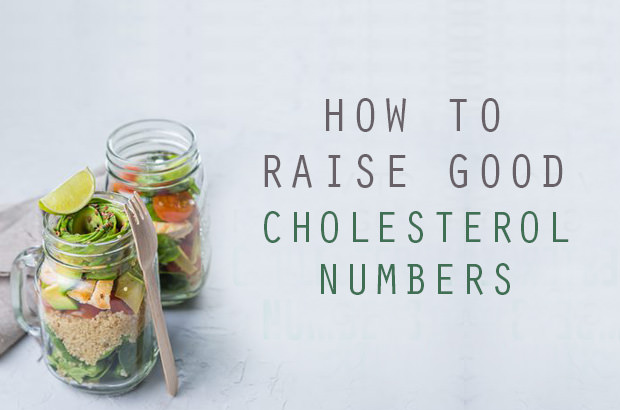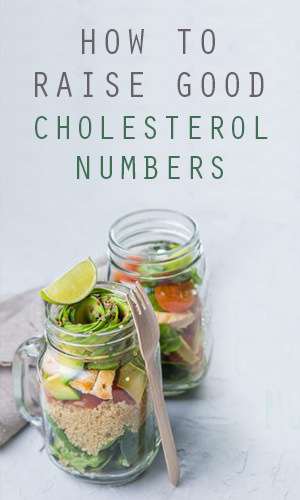
How To Raise Good Cholesterol Numbers

Posted on 23 May, 2022

Despite its bad rap, not all cholesterol is evil. Raising your high density lipoproteins (HDL), or the good type of cholesterol, should be a lifelong goal of everyone beginning in their teens. It helps to carry away low density lipoproteins (LDL), the bad type of cholesterol, before it has a chance to adhere to the inside of your arteries — particularly the coronary arteries that supply blood to your heart. There are several proven ways to raise your HDL: diet, exercise, weight reduction and smoking cessation. Keep reading for more specific tips.
 1. Start With a Baseline
1. Start With a Baseline
First, you need to know where you stand with regards to your cholesterol numbers. Ask your doctor to perform a blood lipid profile test to determine if your cholesterol numbers are within the normal range. He'll review with you the results of the test, focusing on your total cholesterol, LDL and HDL cholesterol levels. Ideally, your total cholesterol is below 200 mg/dL and your HDL is above 60 mg/dL. File your results for later reference.
 2. Get Moving!
2. Get Moving!
You don't have to hit the gym for two hours a day to have a positive impact on your cholesterol. Start small and simple with an exercise program that emphasizes 20 to 30 minutes of aerobic exercise most days of the week. This can be going for a brisk walk during your lunch hour with a coworker, riding your bike to work, taking your pup for a walk or playing a pick-up game of your favorite sport. If you can't take the time to exercise for 30 minutes in one session, consider breaking it into two smaller sessions. But to effectively raise your HDL cholesterol, try to extend the duration of your exercise.
[Related: Cardio For Very Busy People]
 3. Drop Any Excess Weight
3. Drop Any Excess Weight
If you're obese or overweight, losing weight goes a long way in improving your cholesterol. Obesity not only lowers your HDL cholesterol, it raises your LDL cholesterol. If you're not sure whether you're overweight, calculate your hip to waist ratio. Measure your hips and your waist, which is much more reliable than your BMI. Divide your waist measurement by your hip measurement. If you're a man, you're overweight if your ratio is over 1. If you're a woman, you're overweight if your ratio is over 0.8.
[Related: 28 Eating Secrets to Help You Lose Weight (and Save Money Too!)]
 4. Kick Your Smoking Habit
4. Kick Your Smoking Habit
If you smoke cigarettes, stop smoking. While there are plenty of reasons to abandon your cigarette habit, smoking lowers HDL levels and is the single most preventable risk factor for heart disease. Consider this statistic from the Mayo Clinic: "Within 20 minutes of quitting, your blood pressure and heart rate decrease. Within one year, your risk of heart disease is half that of a smoker. Within 15 years, your risk of heart disease is similar to someone who never smoked."
[Related: Tips To Quit Smoking]
 5. Clean Up Your Diet
5. Clean Up Your Diet
One of the best (and easiest!) ways to raise your HDL and lower your LDL is by making heart-healthy changes to your diet. Swap calorie-dense fast foods (that also often contain trans fat) for nutrient-dense and fiber-rich foods like fruits, vegetables and whole-grain baked goods. Increase your HDL by eating more omega-3 fatty acids, which can be found in fish like salmon, trout and herring. Some doctors recommend eating oatmeal and raw walnuts and taking two 1,000 mg capsules of fish oil a day to help with cholesterol levels. Avoid fad diets with outlandish claims.
[Related: 29 Recipes That Prove Clean Eating Can Be Easy and Delicious]
 6. Consider Medication
6. Consider Medication
If these lifestyle changes still aren't enough, talk to your doctor. Ask about medications designed to increase your HDL if you're at high risk for heart disease and need to significantly raise your HDL cholesterol. The most common drug class is the statin class. You can also take niacin supplements, but be prepared for some unsavory side effects like hot flashes, itching and flushing.
What Do YOU Think?
When was the last time you checked your cholesterol? Do you remember what your numbers were? Do you need to raise your HDL or lower your total cholesterol? What did your doctor recommend? Do you think you'll try any of the above tips? Is there anything else you've done? Share your stories and questions in the comments below!
Must Read Books On Cholesterol

by Jonny Bowden

by Dr Fred Kummerow

by Lisa A. Sheldon

by Nina Teicholz
 Will Running Ruin Your Knees?
Will Running Ruin Your Knees? Safety Tips For Running At Night
Safety Tips For Running At Night 9 Unhealthy, Even Dangerous Weight-Loss Diets
9 Unhealthy, Even Dangerous Weight-Loss Diets 10 Surprising Flat-Belly Foods
10 Surprising Flat-Belly Foods










